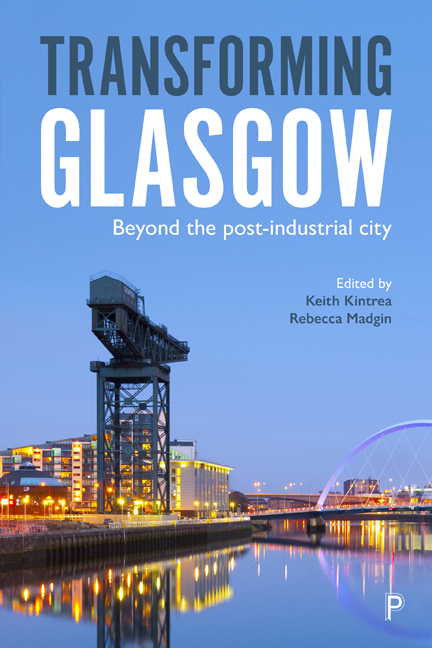Book contents
- Frontmatter
- Contents
- List of Maps, Tables, Figures and Boxes
- Notes on Contributors
- Acknowledgements
- Foreword
- Map
- Introduction: Transforming Post-Industrial Glasgow – Moving Beyond the Epic and the Toxic
- PART I
- PART II
- PART III
- Conclusion: Beyond the Post-Industrial – Narratives of Time and Place
- Index
12 - Revisiting the Creative City: Culture and Regeneration in Post-Industrial Glasgow
Published online by Cambridge University Press: 25 March 2021
- Frontmatter
- Contents
- List of Maps, Tables, Figures and Boxes
- Notes on Contributors
- Acknowledgements
- Foreword
- Map
- Introduction: Transforming Post-Industrial Glasgow – Moving Beyond the Epic and the Toxic
- PART I
- PART II
- PART III
- Conclusion: Beyond the Post-Industrial – Narratives of Time and Place
- Index
Summary
Its new appearance indeed persuades that it may become Britain's first major post-industrial success.
(‘The Repackaging of Glasgow’, Sunday Times, 2 December 1984)Introduction
The narratives of cultural regeneration in post-industrial cities are wellknown. Landry and Florida's concepts of the ‘creative city’ (Landry and Bianchini, 1995) and ‘creative class’ (Florida, 2002) informed a raft of urban redevelopment policies espousing that creatively devised, culturally led urban redevelopment could attend to the myriad of social, economic and environmental problems that post-industrial cities, in particular, were experiencing. Indeed, it was from Glasgow that the ‘creative city’ thinking emerged, drawn from a report Landry produced for the Glasgow Development Agency entitled Making the Most of Glasgow's Cultural Assets: the creative city and its cultural economy (1991). Glasgow became, for many, the ‘poster city’ for the argument that culture could be a means through which urban fortunes could be restored, having somewhat surprisingly attained the European City of Culture accolade in 1990. Unlike previous recipients, whose cultural cachet was assured – Athens (1985), Florence (1986), Amsterdam (1987), West Berlin (1988) and Paris (1989) – Glasgow was the first city to use the City of Culture as a springboard for its transformation from, as the Business Traveller put it in September 1985, the ‘violent, despairing city that was the Glasgow of the Gorbals legend’ to an ‘innovative, energetic and attractive city and a major cultural centre in its own right’ (GDC, 1986, p 6; see García, 2005).
Against this over-arching metanarrative of transformation, however, others argued that the City of Culture was little more than a veneer masking the profound social and structural problems the city faced (for example see, Boyle and Hughes, 1991; Tretter, 2009), and that it largely neglected Glasgow's industrial, working class heritage. The ‘creative city’ and ‘creative class’ concepts also came to be widely critiqued (see Peck, 2005; Markusen, 2006; Scott, 2006), and, as regeneration became synonymous with gentrification, how culture played a role in the remaking cities was called into question with attention drawn to precisely what constituted the ‘creative city’ (see Pratt, 2008, 2010, 2011; Oakley, 2015).
- Type
- Chapter
- Information
- Transforming GlasgowBeyond the Post-Industrial City, pp. 239 - 256Publisher: Bristol University PressPrint publication year: 2019



